Fiberglass vs Concrete Pools: Florida Comparison
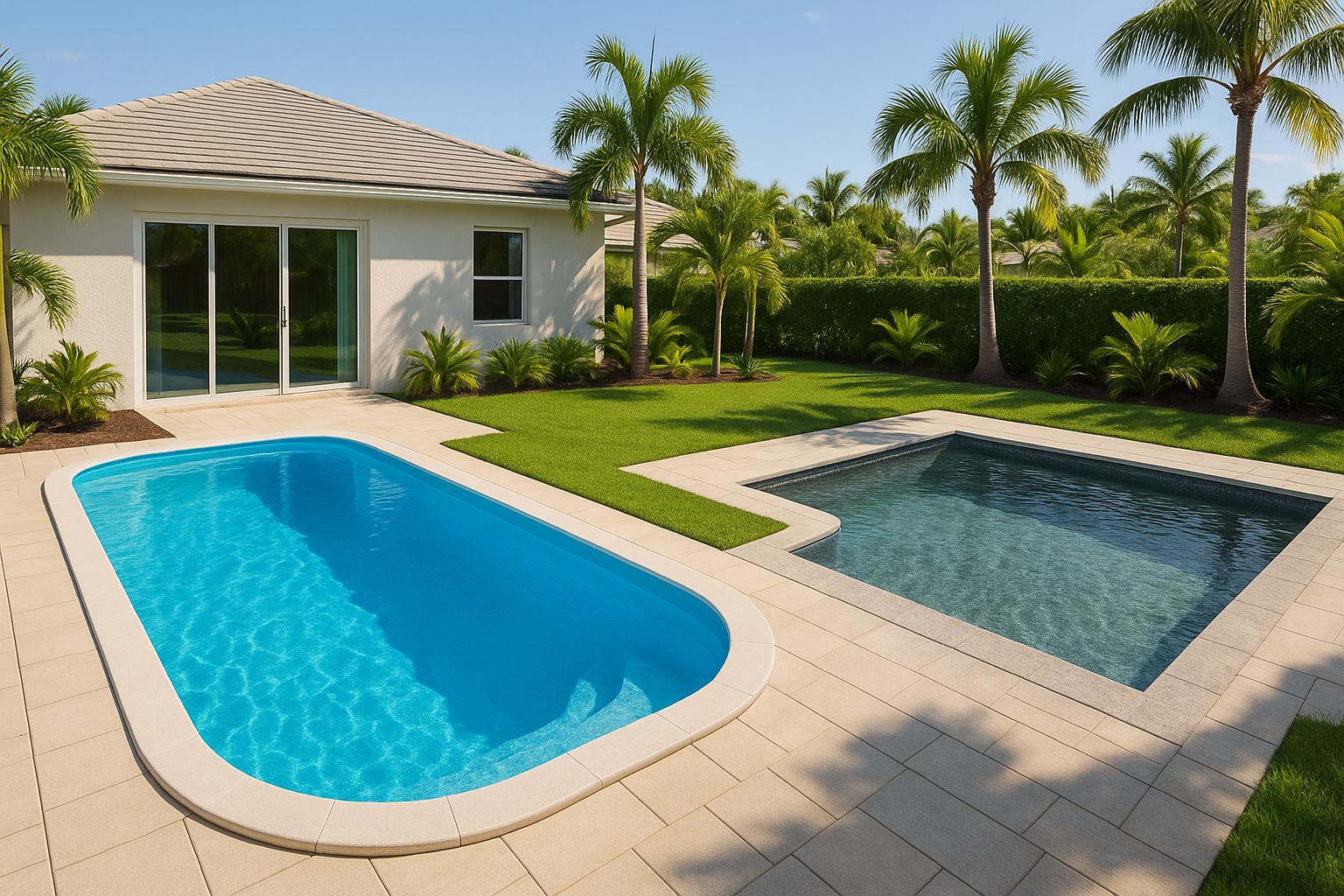
Fiberglass vs Concrete Pools: Florida Comparison
When choosing between fiberglass and concrete pools in Florida, the decision hinges on factors like durability, maintenance, cost, and how well each option handles Florida’s intense climate and soil challenges. Here’s a quick breakdown:
- Fiberglass Pools: Easier to maintain, quicker to install, and resistant to algae and UV damage. They perform well in Florida's shifting sandy soils but offer limited design flexibility.
- Concrete Pools: Fully customizable with a longer lifespan, but require more maintenance and have higher upfront costs. They are durable but may crack in unstable soil conditions.
Quick Comparison
| Factor | Fiberglass Pools | Concrete Pools |
|---|---|---|
| Installation Time | Few weeks | 3–6 months |
| Upfront Cost | Lower | Higher |
| Maintenance | Easier, fewer chemicals | More upkeep, frequent resurfacing |
| Durability | Long-lasting, resists UV damage | Strong, customizable, but prone to cracking |
| Customization | Limited | Unlimited |
| Hurricane Resistance | Flexible, handles soil shifts | Rigid, may need extra engineering |
| Algae Growth | Minimal due to smooth surface | Higher due to porous material |
Fiberglass pools are ideal for low-maintenance and quicker installations, while concrete pools are perfect for those seeking a custom design and long-term durability. Choose based on your priorities and budget, keeping Florida's climate and soil in mind.
Fiberglass Pools: Pros and Cons in Florida
Fiberglass Pool Features and Benefits
Fiberglass pools are pre-made shells that are installed into a prepared excavation. They come with a smooth gel coat surface, which helps resist algae growth, cracking, and staining. This coating also reduces chemical absorption, making cleaning and maintenance easier. Since these pools are produced in a factory-controlled environment, the quality remains consistent.
Fiberglass Pool Advantages in Florida
Thanks to their design and production process, fiberglass pools are well-suited for Florida's unique climate. The factory-controlled manufacturing ensures they are structurally strong, making them capable of handling Florida's shifting soil conditions. Additionally, the gel coat finish is highly durable, meaning it usually doesn’t require frequent refinishing or replacement.
Fiberglass Pool Drawbacks in Florida
According to manufacturer data, there are no major disadvantages associated with fiberglass pools in Florida.
Fiberglass Pool Costs and Maintenance in Florida
Fiberglass pools are built to last, with an expected lifespan of 30 to 50 years when properly maintained. This durability can lead to lower long-term costs, which is especially valuable for Florida homeowners who often deal with challenging weather conditions.
Concrete Pools: Pros and Cons in Florida
Concrete Pool Features and Benefits
In Florida, where extreme weather and shifting soils demand durable solutions, concrete pools stand out for their resilience and versatility. These pools are built on-site using reinforced concrete combined with gunite or shotcrete, creating a sturdy, customizable structure. This construction method allows for virtually endless design possibilities, including features like tanning ledges, waterfalls, built-in spas, infinity edges, and intricate tile designs.
The use of gunite results in a denser, more uniform shell, which enhances structural strength - an essential quality for Florida's challenging conditions, such as shifting soils and high water tables. This solid construction ensures concrete pools can handle the state's unique environmental demands.
Concrete Pool Advantages in Florida
Concrete pools are a popular choice in Florida due to their unmatched durability and ability to be tailored to individual preferences. These pools can endure Florida's intense sunlight, heavy rainfall, and tropical storms without warping, fading, or cracking - provided they are properly engineered. The reinforced steel rebar used in their construction offers reliable protection against ground movement and seasonal changes, which are common in coastal regions.
"Concrete pools, often referred to as gunite or shotcrete pools, are like the battleships of the pool world: strong, durable, and customizable." – Agua Construction
Beyond their strength, concrete pools can enhance property values, sometimes increasing resale value by as much as 7%. They are also well-suited for heavy usage, making them a practical choice for families or those who frequently entertain.
Concrete Pool Drawbacks in Florida
While concrete pools have many advantages, they are not without their challenges. The on-site construction process takes longer than pre-manufactured options, which can be a drawback for homeowners seeking quicker installation. Additionally, the porous surface of concrete requires consistent maintenance, including regular chemical balancing and cleaning, to prevent algae growth. In areas with sandy soils and high water tables, these pools may be more prone to cracking, and repairs can be expensive.
Concrete Pool Costs and Maintenance in Florida
Cost and maintenance are important factors to consider when investing in a concrete pool. In Florida, installation costs typically range from $50,000 to $120,000, with luxury designs often falling between $70,000 and $120,000 or more. The cost per square foot varies from $95 to $374, depending on the complexity of the design and additional features.
"Concrete pools are known for their strength and longevity. Properly built and maintained, a concrete pool can easily last for several decades, making it a smart investment for homeowners who value quality and durability." – Somar Pools, LLC
When cared for properly, a concrete pool can last over 50 years before requiring major renovations. However, Florida's warm and humid climate can lead to higher maintenance costs, as it often necessitates more frequent chemical adjustments and professional cleanings to keep the pool in optimal condition.
Fiberglass vs. Concrete Pools: Hear What an Owner of Both Pools Thinks!
Fiberglass vs Concrete Pools: Side-by-Side Comparison for Florida
When deciding between fiberglass and concrete pools in Florida, it's essential to weigh factors like installation time, upkeep, customization possibilities, and how well each option holds up in the state's unique climate. Here's a breakdown of the key differences to help you make an informed choice.
Comparison Table: Key Factors for Florida Pools
| Factor | Fiberglass Pools | Concrete Pools |
|---|---|---|
| Installation Timeline | Faster to install | Takes longer to construct |
| Upfront Cost | Lower initial cost | Higher initial investment, especially for custom designs |
| Maintenance | Easier to maintain due to smooth, non-porous surface | Requires more upkeep, including periodic resurfacing |
| Durability in Heat & Weather | Withstands UV exposure and weather well | Highly durable with proper maintenance, though resurfacing may be needed |
| Hurricane/Storm Resistance | Flexible design adapts to shifting soils | Rigid structure can be affected by soil movement |
| Customization Options | Limited to manufacturer’s designs | Fully customizable in shape, size, and features |
| Energy Efficiency | Retains heat well thanks to insulation properties | May be less energy-efficient, impacting heating costs |
| Algae Resistance | Smooth surface reduces algae growth | Porous surface may require more chemicals to manage algae |
| Soil Compatibility | Lightweight and works well in sandy soils | Heavier and may need extra engineering in unstable soils |
| Lifespan & Resale Value | Long-lasting with moderate impact on resale value | Durable over time and can boost property value significantly |
Fiberglass pools are popular for their smooth finish, which reduces chemical usage and makes maintenance easier. Their quicker installation is also a big plus, especially when trying to avoid Florida's storm season.
On the other hand, concrete pools shine when it comes to customization. You can design them to fit your exact vision, from unique shapes to special features. They also offer excellent durability with proper care. However, the longer build time and potential need for extra engineering in areas with unstable soil are worth considering.
Choosing between these two pool types ultimately comes down to your priorities. If you’re looking for a low-maintenance, quick-to-install option, fiberglass might be the way to go. But if you’re dreaming of a one-of-a-kind pool that fits your specific vision, the flexibility of concrete could be worth the extra effort. Both options have their strengths, and understanding these differences is key to making the right decision for your Florida home.
sbb-itb-3649da6
Florida Pool Regulations and Climate Factors
When planning a pool installation in Florida, it’s crucial to consider more than just materials and timelines. Local regulations and the state’s unique climate play a significant role in how well your pool performs over time. Adhering to these rules not only ensures compliance and safety but also helps your pool withstand Florida’s challenging environmental conditions.
Florida Pool Permits and Building Codes
Before construction begins, homeowners in Florida must secure building and electrical permits, with requirements varying by county. Local building codes often specify setback distances and structural standards designed to handle severe weather. For example, properties in coastal zones may need additional engineering assessments, especially when using materials like concrete that require extended curing times. To avoid unnecessary delays, it’s essential to consult local authorities about the necessary guidelines and inspections at each stage of construction. These codes are designed to help your pool endure Florida’s weather challenges effectively.
Climate Factors and Weather Resistance
Florida’s climate introduces unique obstacles to pool construction. The sandy soil and high water table can cause ground shifts and water intrusion, requiring careful planning. Fiberglass pools may offer some advantages due to their flexibility, but concrete pools need particularly strong designs to handle soil movement. Additionally, the state’s long hurricane season, heavy rainfall, and intense UV exposure demand durable construction and properly protected equipment. Factoring in these conditions is key to choosing the right pool type for Florida’s environment.
Safety and Maintenance Requirements
Florida’s regulations also emphasize pool safety, requiring features like barriers and strict electrical protocols to address the risks of severe weather. These safety measures go hand-in-hand with the ongoing maintenance needs of both fiberglass and concrete pools. The state’s high humidity and frequent rain increase the importance of regular upkeep. Routine chemical balancing and equipment checks are crucial to ensure your pool remains safe and functional throughout the year.
Revio's Role: Pool Planning Help for Florida Homeowners
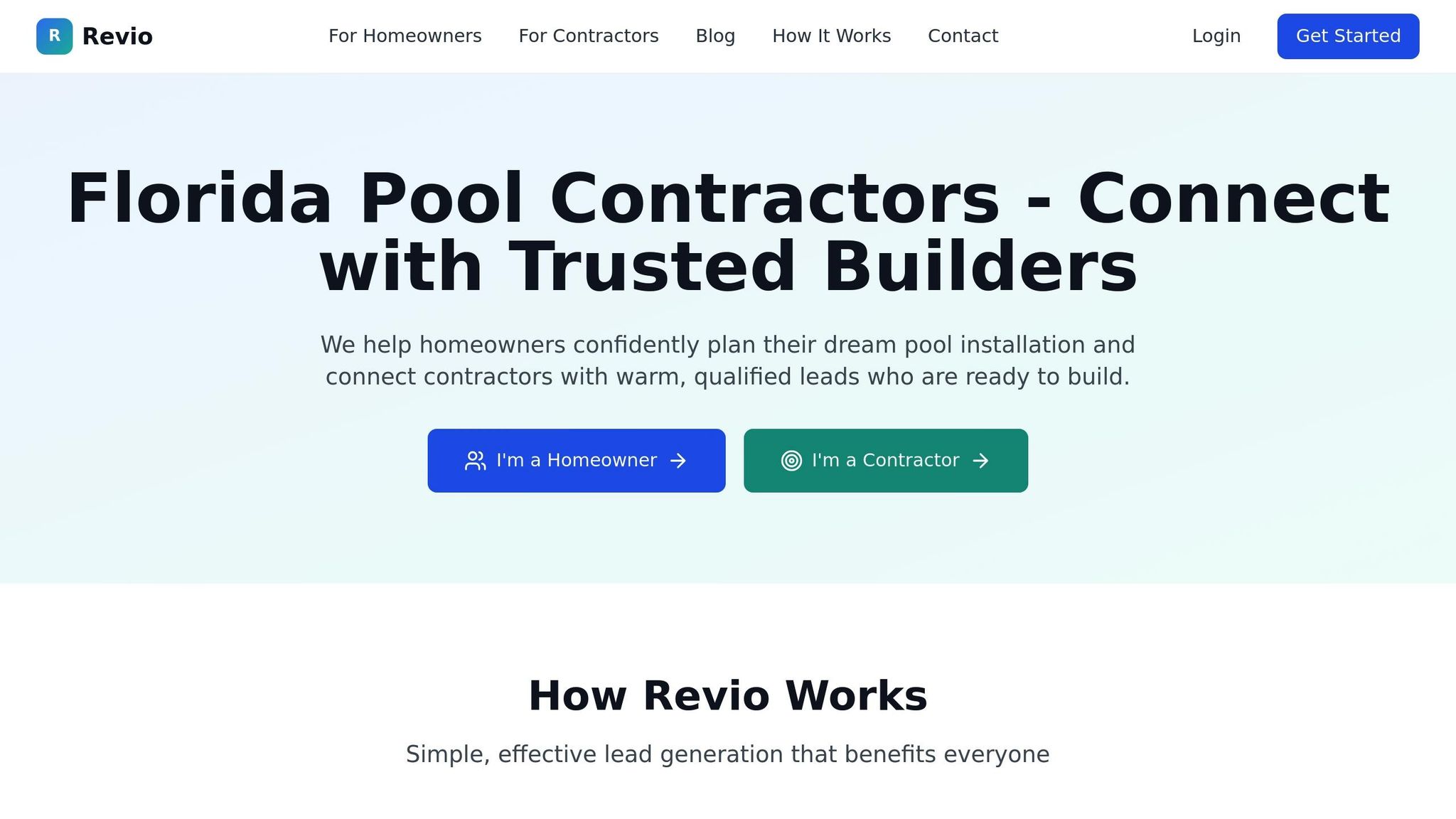
Building a pool in Florida comes with its own set of challenges - think specific materials, strict regulations, and the unique demands of the climate. Revio makes the process easier by connecting homeowners with skilled pool contractors and offering resources designed specifically for Florida's conditions.
Finding Contractors with Revio
Revio helps you find contractors who truly understand the local landscape. By sharing your project details with their team, you’ll be matched with pre-screened professionals experienced in fiberglass and concrete pool installations.
Every contractor in their network is thoroughly vetted for licensing, insurance, and local expertise. This local knowledge is especially helpful when weighing your options, as these experts can explain how different materials hold up in Florida’s environment.
This service saves you a ton of time. Instead of spending weeks researching and contacting multiple companies, you’ll quickly connect with professionals who are ready to discuss your project and timeline.
Revio doesn’t stop at contractor matching - they also provide the tools and knowledge you need to plan every aspect of your pool project.
Florida Pool Planning Resources from Revio
Revio offers a free Pool Planning Guide specifically designed to address the challenges of building pools in Florida. This guide is an essential resource for navigating the ins and outs of pool construction in the Sunshine State.
The guide breaks down the pros and cons of different pool types based on Florida’s climate. It also includes detailed cost breakdowns, factoring in things like soil preparation, drainage systems, and other essential features. Plus, it offers step-by-step regulatory guidance, with permit checklists, safety tips, and maintenance strategies tailored to Florida’s long swimming season.
You’ll also find a contractor evaluation checklist and practical advice for saving time and money - helping you avoid expensive missteps. With these resources, you’ll feel prepared to tackle your pool project confidently and efficiently.
Conclusion: Choosing the Right Pool for Your Florida Home
When deciding between fiberglass and concrete pools for your Florida home, it’s essential to consider how each performs under the state’s unique climate conditions. Florida’s intense sunlight, high humidity, and salt-filled coastal air present challenges that can impact your pool’s durability, maintenance, and long-term expenses.
Fiberglass pools stand out in Florida’s environment thanks to their low maintenance needs and natural resistance to algae. With proper care, these pools can last for decades, often backed by warranties of up to 25 years. However, they come with one tradeoff: limited design flexibility.
On the other hand, concrete pools offer unmatched customization and durability, making them ideal for homeowners looking for a one-of-a-kind design. That said, concrete pools require more upkeep and come with higher ongoing costs, as Florida’s climate tends to accelerate wear and tear. Local building codes and regulations also play a key role in shaping your decision.
Florida’s strict pool safety and construction codes are another critical factor. For example, pool barriers must measure at least 54 inches high, gates need specific release mechanisms, and pool alarms must produce a sound pressure of at least 85 decibels at a distance of 10 feet. As Agua Construction explains:
"The Florida Building Code acts as this rulebook, setting the standard for design, construction, and safety of residential swimming pools. These codes are not just bureaucratic red tape; they are the foundation that supports the integrity and safety of your pool."
To navigate these technical and climate-specific considerations, working with experienced professionals is key. Tools like Revio’s pre-screened contractor network and their detailed Pool Planning Guide can help you make informed decisions, from selecting materials to understanding permit requirements.
Ultimately, whether you opt for fiberglass or concrete, choosing materials that can endure Florida’s tough conditions and ensuring compliance with local regulations will keep your pool a source of relaxation and enjoyment - not a constant hassle - for years to come.
FAQs
What are the long-term maintenance cost differences between fiberglass and concrete pools in Florida?
Fiberglass pools are a popular choice in Florida, largely because they tend to have lower maintenance costs over time. Their durable design resists cracking and algae buildup, which means fewer headaches for homeowners. Plus, they require less cleaning and fewer chemicals, helping to keep ongoing expenses in check.
On the other hand, concrete pools usually come with higher maintenance demands. They often need regular resurfacing, more frequent repairs, and constant chemical balancing to ward off algae and staining. In Florida's humid climate, these upkeep requirements can really add up, making them a more costly option over the years.
What challenges does Florida's sandy soil pose for pool installation, and how do fiberglass and concrete pools handle these conditions?
Florida’s sandy soil can pose some distinct hurdles when it comes to installing a pool, especially with issues like shifting ground and high groundwater levels. Fiberglass pools, for instance, are lightweight and come pre-made, which makes them more susceptible to moving or even lifting if the pool's water level gets too low or if groundwater pressure becomes excessive. Concrete pools, on the other hand, are significantly heavier, which helps them stay firmly in place even under similar conditions.
Both types of pools can perform well in Florida, provided they're installed correctly. Key steps like ensuring proper drainage and keeping water levels stable are crucial. That said, working with seasoned professionals is essential to navigate these soil-related challenges and ensure a long-lasting installation.
How do Florida's climate and building codes affect the choice between fiberglass and concrete pools?
Florida's warm, sunny weather is a key factor when deciding between fiberglass and concrete pools. Fiberglass pools tend to perform better in Florida's environment because their flexible material can handle temperature swings and intense heat without cracking. On the other hand, while concrete pools are known for their strength, they’re more likely to develop cracks in extreme heat and typically demand more upkeep over time.
Local building codes in Florida also play a significant role in pool design and installation. For instance, safety regulations require features like fences that are at least 54 inches tall. These additions not only increase costs but can also influence how your pool area is designed. Considering both the climate and these local requirements is essential when choosing the right pool type for your home.
Tags:
Related Articles
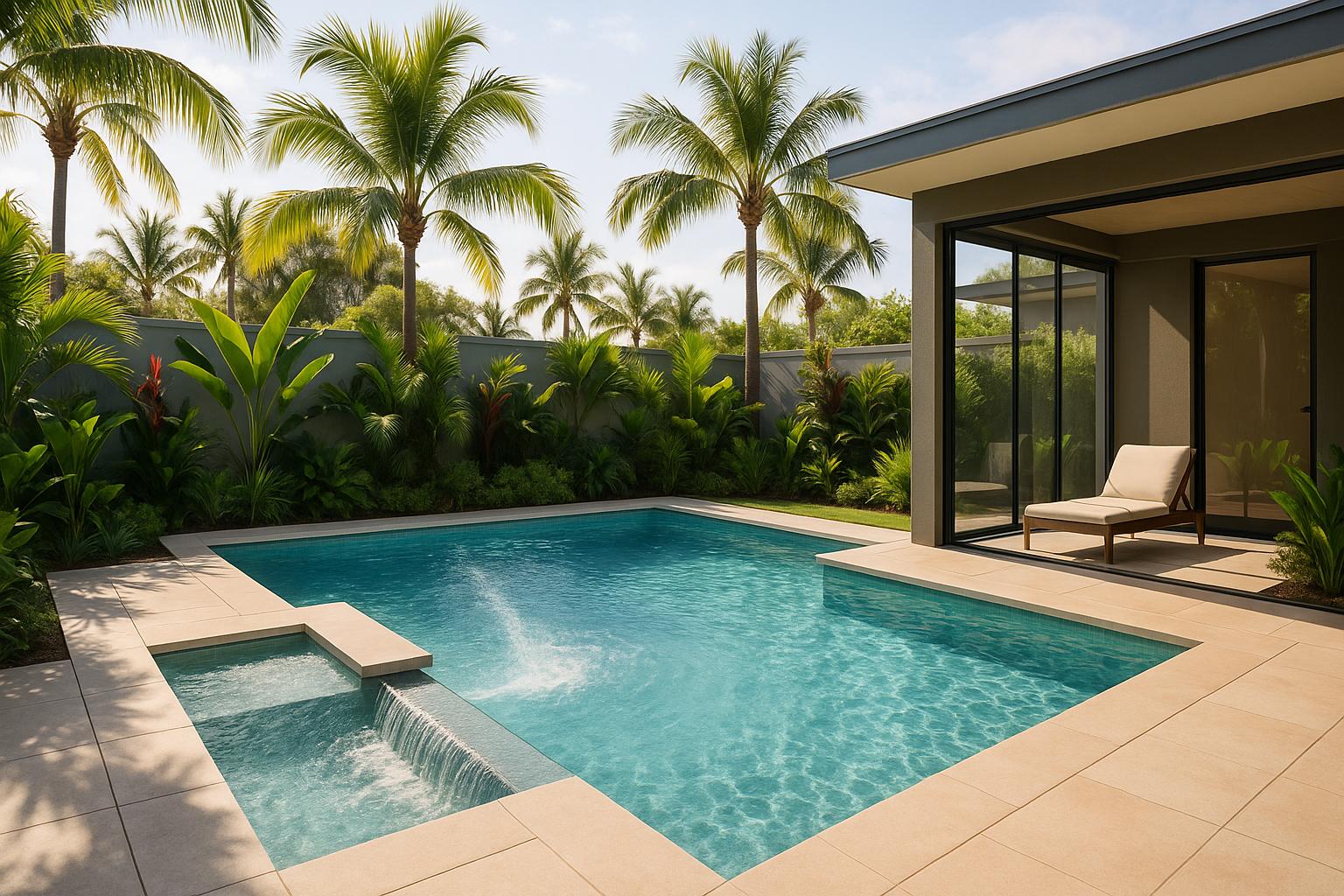
Best Pool Features for Florida Climate
Explore essential pool features for Florida's climate, including heat-resistant materials, cooling systems, and storm protection for year-round enjoyment.
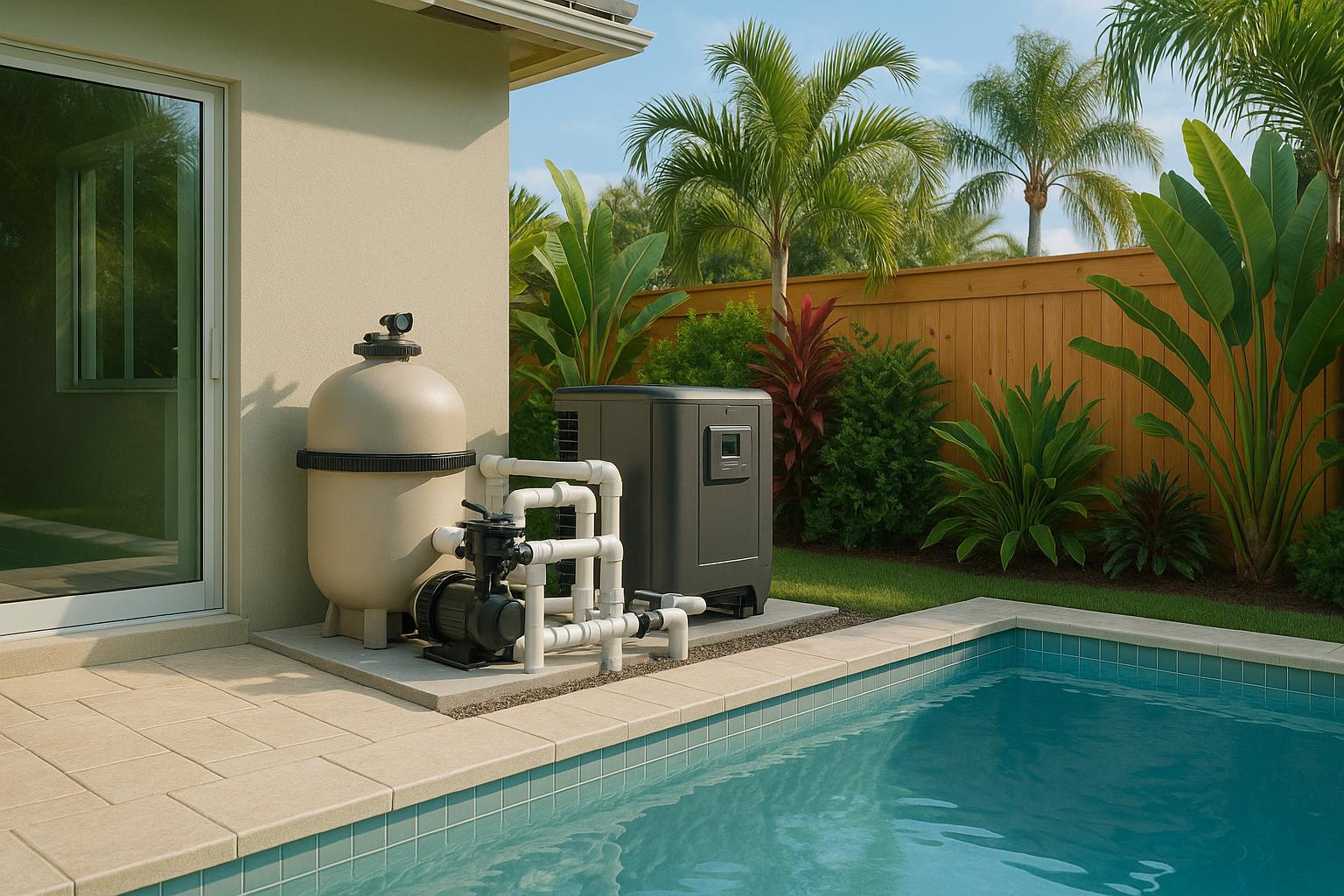
Florida Pool Equipment Installation Rules
Learn about Florida's pool equipment installation rules, including safety, licensing, permits, and compliance with local regulations.
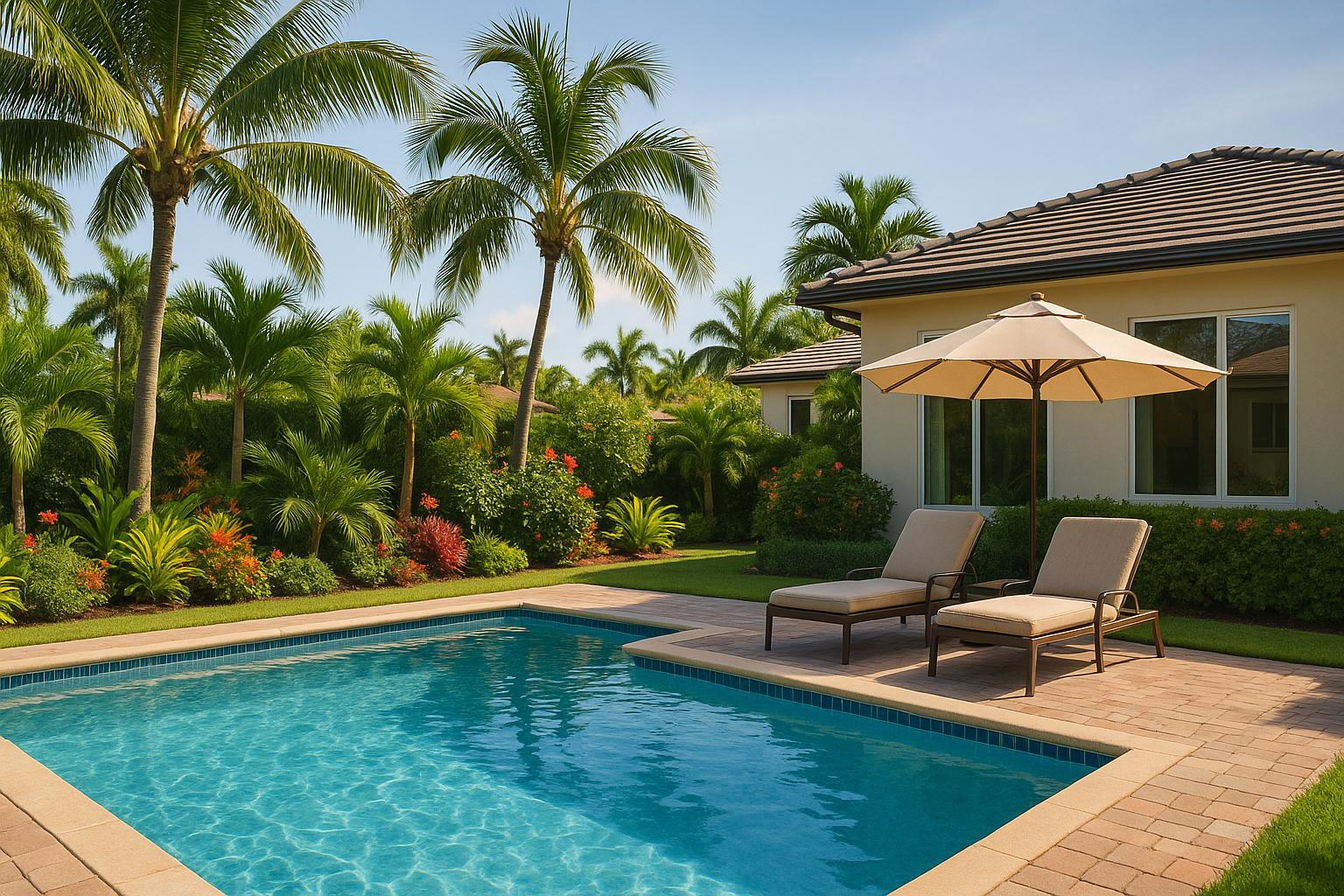
Top Florida Lenders for Pool Loans
Explore top lenders in Florida for pool financing, comparing rates, terms, and unique features to help you fund your dream pool project.
Ready to Start Your Pool Project?
Connect with trusted, pre-screened pool contractors in Florida
Get Started Today